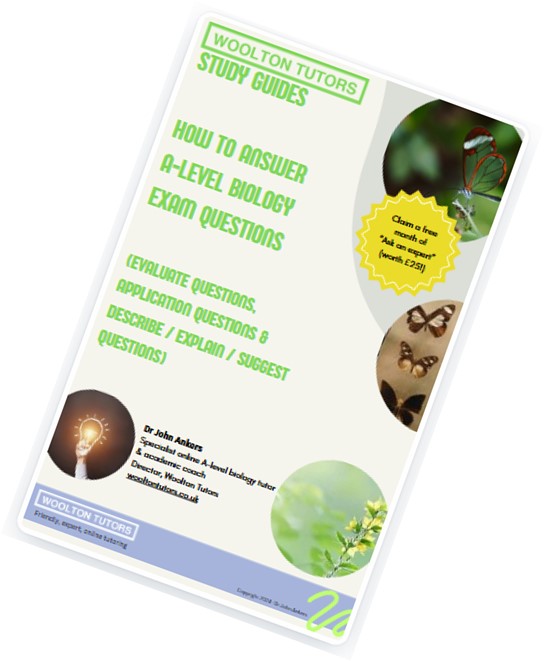The wording of A-level biology describe and explain questions is important. Often when people lose marks in exams, it’s not due to being completely wrong, but slightly wrong – the answer might make perfect sense, but miss the point of the question. Very frustrating!
I’ve written about how to answer A-level biology evaluate questions, and application questions, (and how to choose a statistical test), but what about Describe and explain questions? What’s the difference? What does each question want from you?
Answering A level biology describe questions
“Describe” questions want to know what is happening in front of you – perhaps in a graph, a scientific diagram or a picture. You need to describe what you can see!

Imagine the examiner doesn’t know any biology and can’t see the paper – your job is to tell them what’s going on. What is the line in the graph doing? What is the plant in the picture above doing in response to sunlight?
The line may show a relationship between two variables – look for their names on the axes of a graph. Can you see a correlation between temperature and enzyme activity? Or, for the plant picture, the bend of a plant and the light levels around it?
Steer clear of using “it” in your descriptions – use scientific names instead. “The gradient of the line is…” or “the line representing enzyme activity flattens after…”
Keep an eye on the number of marks the question is worth – these will tell you how many details you need to mention.
Answering A level biology explain questions
Explain questions want to know why something is happening. You may still have a graph in front of you, but why does it look like that?
Focus on scientific explanation – what is going on “behind the scenes”? If the graph is of enzyme activity, we might talk about how the enzyme meets the substrate and the effect of temperature on how often this happens – explaining why the graph points upwards.
Use clear language here, too. Instead of “it” use the correct names for whatever you are writing about. Clear language doesn’t have to involve lots of scientific words. The idea is that your points logically follow each other. This happens, then this happens… so in the graph this happens.
Use the word “because” in your answer – it’s a good way to focus yourself on the explanation rather than the description.
Answering A level biology describe and explain questions
Some exam questions ask you to both “describe and explain”. Here you can be methodical – look at the number of marks for the question and divide it in half. This is the number of points you need to mention, including a description and explanation for each.
Remember for each pair of marks – first describe “What does this look like?” then explain “Why does it look like that?”
Answering A level biology Suggest questions
Some questions may ask you to “suggest an explanation” for a graph or an event in the text. This is slightly different to an “explain” question as it gives you a little more freedom.
There may be multiple reasons why something behaves as it does, or why a line flattens on a graph. Your job here is to pick a theory than makes sense, then argue how and why it explains what’s going on. The mark scheme will likely have lots of flexibility to allow for whichever explanation you choose.
If you have any questions about the difference between suggest, describe and explain questions just get in touch.
Good luck!
 You can find an expanded version this guide, with added bits including model answers to real describe and explain exam questions, in our shiny eBook “How to answer A-level Biology exam questions“. A purchase from our shop gives you a month’s free subscription to “ask an expert” – very useful for some exam practice 🙂
You can find an expanded version this guide, with added bits including model answers to real describe and explain exam questions, in our shiny eBook “How to answer A-level Biology exam questions“. A purchase from our shop gives you a month’s free subscription to “ask an expert” – very useful for some exam practice 🙂
If you’d like to work through some A-level biology describe and explain questions, from exam boards like AQA, please get in touch with me at Woolton Tutors, and we can set up some online A-level biology tutoring sessions. AQA students might be interested in my weekly A-level biology masterclass sessions for practice on exam technique.
Best wishes,
John
Dr John Ankers
Specialist online A-level biology tutor and academic wellbeing coach

